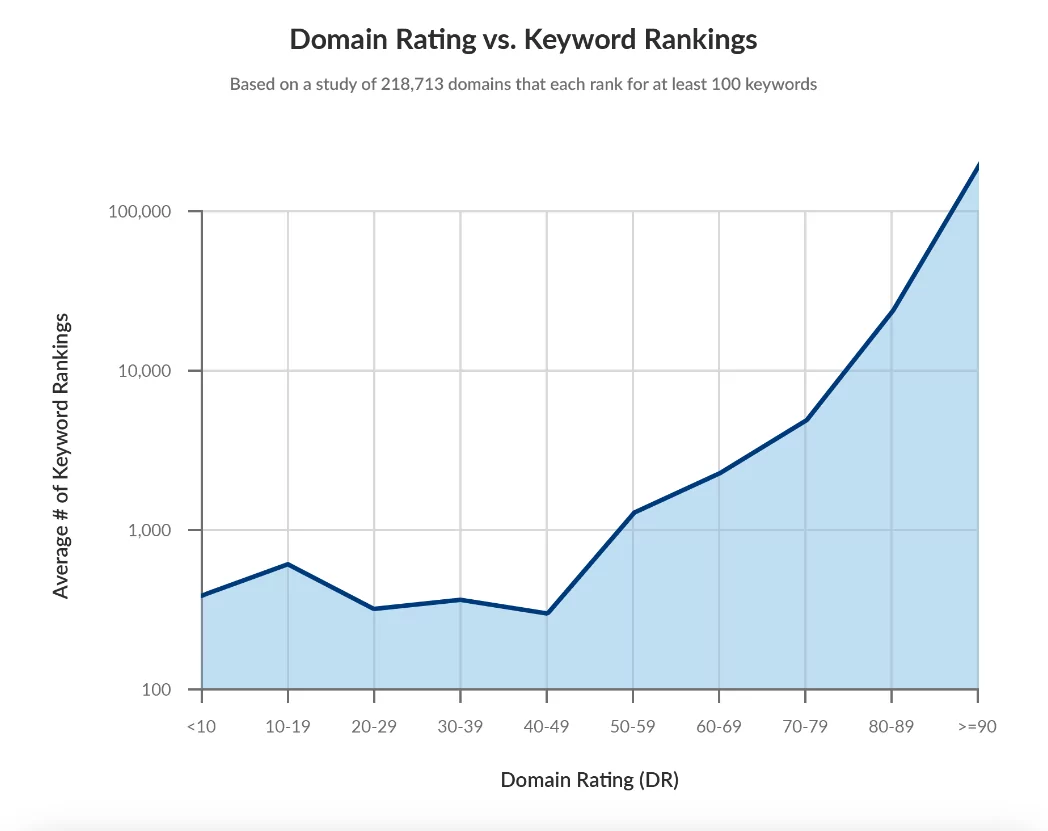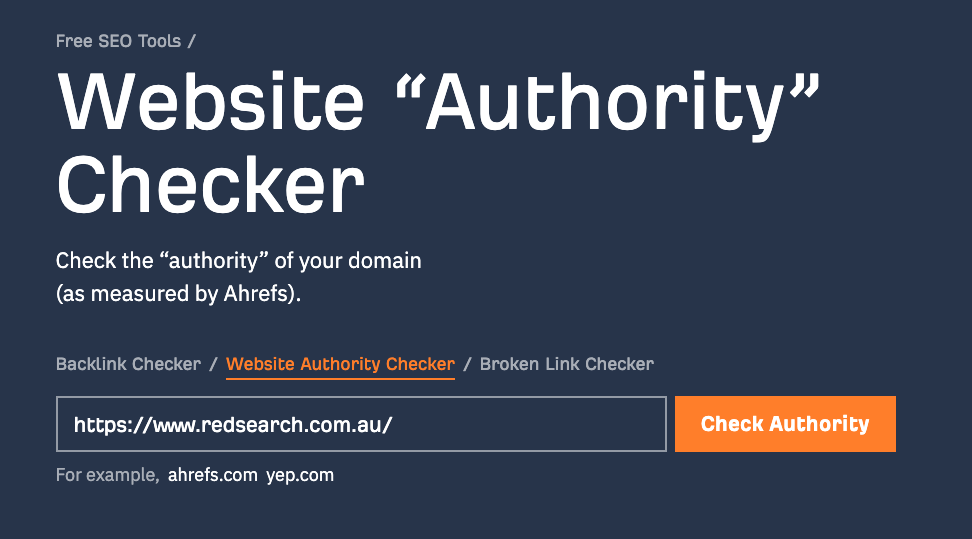
- Red Search
- Resources
- Domain Authority
Domain Authority & SEO: Everything You Need To Know
-
 Daniel Law
Daniel Law
If you have been poking into the SEO sphere, you may have unsuspectedly come across a thing we call Domain Authority, DA for short.
If you find that your top-ranking SEO keywords are dropping and are curious about how Domain Authority impacts your digital presence, we got you covered.
What is Domain Authority?
In a nutshell, Domain Authority is a well-known SEO metric that indicates a website or a domain’s overall strength, aka ‘Authority Score’.
Domain Authority runs from a scale of 1-100, with a higher score indicating that your website will have a better chance of ranking competitively in search engines.
Moz developed this SEO scoring system to approximate how well a website performs or ranks in Google SERPs. This came as a result of Google officially removing their famous PageRank scoring system from public view.
Types of Authority Scores in SEO
Over the years, many leading SEO tools have also come out with their variations. See below for the most popular ones.
- Moz – Domain Authority
- Semrush – Authority Score
- Ahrefs – Domain Rating
- Majestic – Trust Flow & Citation Flow
Generally, most SEOs use Moz’s domain authority as the main metric to track. This is mostly because it was the first to launch and the metric to gain widespread market adoption.
Since then, the growth of Ahref’s link database has grown significantly (Ahrefsbot, comes in 2nd just after Googlebot for most active crawler), therefore making their domain rating score a top choice to measure against for many SEO experts.
Why is Domain Authority Important?
Calculating your website’s Domain Authority will help you assess your position and strength in the market.
To check your site’s Domain Authority, the scoring platform will compare your data with millions of others through many significant ranking factors.
Moreover, calculating Domain Authority involves complex machine learning that uses a bespoke set of algorithms to benchmark your site ranking across thousands of others properly.
See the graph below, showing how domains with higher Domain Authority tend to rank for more keywords on Google.

How is Domain Authority Calculated?
DA calculation assesses several ranking factors into one score, including internal/external links and linking root domains. But remember that Domain Authority isn’t one of Google’s official ranking factors and doesn’t affect your rank on Google SERPs.
These scores will only reflect how well your website performs compared to your search competitors. Our Sydney SEO specialists use them, among other reliable metrics, to measure your ranking strength and gain data-driven insights over time.
The scoring system also uses a machine-learning algorithm to predict your domain’s popularity on Google’s search results. In other words, if your website appears more on several Google SERPs than a different site, then expect your overall DA score to be higher than the competitor.
Additionally, your Domain Authority score will fluctuate in real-time since it results from machine learning having to process new, incoming links in real-time. That means your score will be more likely to change as new data and metrics get incorporated.
Say a competitor site named Brand B acquired one million new links. In that case, Brand B will climb the charts as it scores a higher DA than others. As a result, your score and those below Brand B will slightly decrease relative to how much it increased.
On the other hand, the sheer competition is why growing your Domain Authority from 10 to 30 is more manageable than ranking from 80 to 90.
DA scores are highly subjective and do not affect your Google SERPs. That’s why we use them for comparative analysis instead of an absolute metric.
How to Check Domain Authority Score?
To assess your site’s Domain Authority, you can use the free Link Explorer tool from Moz or the Website Authority Checker from Ahrefs.

If you only have so much time and knowledge to assess your brand properly, our SEO specialists will gladly help you. We can evaluate your SEO health accurately and give you insights you and your team will understand.
What is Considered a Good Domain Authority?
Domain Authority scores are generally broken up into a few key ranges. The ranges include:
- 0-20, growing domains that possess very little authority
- 20-30, can be considered to be established domains that possess some authority
- 30-50, established domains that possess authority
- 50-60, established domains that Google is likely to see as an authority within their niche
- 60+, established domains that Google is most likely to see as an authority within its niche
It’s important to remember that DA scores act as a general guideline and are not considered by Google as an official ranking factor. While your domain may have a great DA score, it can still rank poorly in Google Search. There are also many other SEO factors to consider, and the DA score is just one of them.
How Do I Increase Domain Authority?
The most meaningful way to increase Domain Authority is through link building. This is the process of acquiring relevant, high-quality backlinks back to your website.
It’s important to note that diversification is key to link building. To ensure your DA is constantly improving and stable, all various types of backlinks should be built, acquired, or earned. Putting all your eggs in one basket, acquiring one type of link, is a dangerous practice.
Remember that there’s no overnight solution to achieving a high DA score.
However, here are some tips that have proven to increase DA.
1. Earn backlinks from authoritative websites
Getting a valuable backlink from trustworthy and authoritative websites is key to improving your DA and page authority. Think of branded websites that users in your industry have already heard of and follow.
Backlinks from .gov and .edu websites are considered the most valuable and will likely have a strong impact on improving DA.
2. Avoid acquiring backlinks from low-quality or spammy websites
We recommend completely avoiding spammy link building practices, as these links will only temporarily boost DA.
It’s common for spammy backlinks from low-quality domains to drop off, causing a decrease in DA quickly. Remember, you’re in it for the long term, and temporarily inflating your DA score will only result in returning back at square one.
3. Build links from real websites
It’s typical for webmasters to stumble upon guest posting sites that display fake DA scores to sell backlinks. These types of domains are common in this day and age, when link schemes are common.
Weigh up the risks and rewards when considering such avenues.
4. Build internal links
Building internal links is commonly overlooked, however, we believe it still has a great impact in improving DA and overall SEO rankings.
Run through blog articles and implement internal links where relevant. We suggest not overlooking the power of internal linking.
How are Domain Authority and Page Authority Different?
You might hear the word ‘Page Authority‘ along with Domain Authority and switch the two terms.
However, Page Authority measures the ranking strength of a single webpage. At the same time, Domain Authority evaluates the domain as a whole, including all its subpages.
Hence, if you only want to see how well your latest blog post ranks on your desired keywords, running it in a Page Authority check will be the best way to assess it.
On the other hand, you should do a Domain Authority check to evaluate your entire website’s ranking strength. DA results may involve more metrics and figures than PA, so you need an SEO specialist to sort out the vital insights to make data-driven decisions.
Final Thoughts
With more Australian businesses competing to rank on Google’s first pages, you should leverage every tool in your search arsenal.
That includes comparative metrics such as Domain Authority and confirmed search ranking factors, such as page loading speed and on-page optimisation factors.
Domain Authority scores fluctuate over time, so you must constantly stay ahead of changes and opportunities to improve your score.
Wondering whether your website will benefit from having a higher DA score? Get in touch with us today to find out more about our SEO services, and don’t forget to request a free strategy session!
Warning: Undefined array key "hide_icon" in /www/redsearch_236/public/wp-content/plugins/elementor/includes/conditions.php on line 87
Deprecated: strtolower(): Passing null to parameter #1 ($string) of type string is deprecated in /www/redsearch_236/public/wp-content/plugins/premium-addons-pro/includes/papro-helper.php on line 53
Written by
Daniel Law
Warning: Undefined array key "hide_icon" in /www/redsearch_236/public/wp-content/plugins/elementor/includes/conditions.php on line 87
Deprecated: strtolower(): Passing null to parameter #1 ($string) of type string is deprecated in /www/redsearch_236/public/wp-content/plugins/premium-addons-pro/includes/papro-helper.php on line 53





